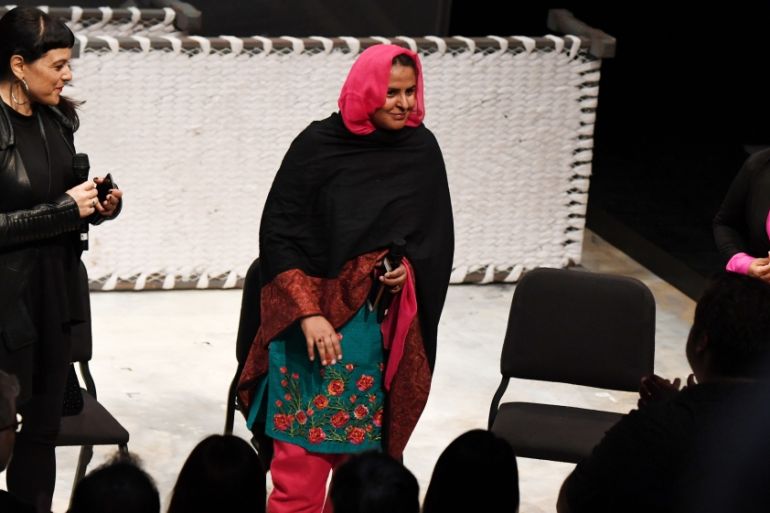Mukhtar Mai revisits ordeal through Thumbprint
Mukhtar Mai travels to LA to watch Thumbprint, which recounts her 2002 rape and decision to take her attackers to court.

Fifteen years after her gang rape by a local clan in her village in Pakistan, Mukhtar Mai is reliving her ordeal, but also her courage, through a US opera inspired by her story.
The opera, by composer Kamala Sankaram and librettist Susan Yankowitz, recounts Mai’s 2002 rape and her decision to defy her attackers and take them to court.
Keep reading
list of 4 items‘Nothing left’: How climate change pushes Indigenous people from their land
‘Refuge of the last dreamers’: Luang Prabang, a city suspended in time
Canadian Nobel-winning author Alice Munro dies aged 92
Mai was raped with the approval of the village council as punishment after her 12-year-old brother was falsely accused of having an illicit relationship with a woman from the dominant clan in the village.
|
|
She travelled this week from her home, in the remote Pakistani village of Meerwala, to attend the west coast premiere.
“I was very emotional when I first started watching it and began reliving the incident in my mind,” Mai, 37, told AFP news agency after attending the Los Angeles premiere of Thumbprint on Friday.
“But then as the opera progressed, it became easier to watch and I felt more courage.”
It was an unusual move in male-dominated Pakistan, where a woman who suffers such a crime often commits suicide rather than endure the stigma and shame associated with it.
Thumbprint first opened in New York in 2014, but Mai had never seen the opera.
While the story on stage ends when Mai’s rapists have been sentenced to death; in reality, her attackers walked free.
They are seemingly going about their daily life with total impunity after their sentences were overturned on appeal.
“My rapists live across from my house and I try not to cross paths with them,” said Mai, who used compensation money from her case to start several schools and a women’s shelter in her village.
READ MORE: India – Men gang-rape woman, smash skull with bricks
“When I walk past, they taunt me and make catcalls.”
In an added strange twist to her story, the children of her rapists attend her school and the daughters of some of the village elders who ordered her rape have sought refuge at her shelter.
“Even though some members of my own family were outraged, I told them I could not turn away the kids as the school is here to serve everyone in the community,” she said.
In 2005, Mai’s name was placed on the country’s Exit Control List after it emerged she was scheduled to fly to London at the invitation of Amnesty International, the rights advocacy group.
Pervez Musharraf, the then Pakistan president, admitted it was the case because he did not “want to project a bad image of Pakistan”.
Delayed justice
Mai acknowledged that her story had empowered women in her village and beyond, giving them the courage to stand for their rights.
But she said she held little hope that the legal system in Pakistan would ever deliver her justice.
High costs, heavy delays, the lengthy appeals process and the dangers associated with producing witnesses has had a huge effect on getting justice for rape victims in Pakistan, according to aid workers.
“The delays are astounding. It may take five to seven years for a case to finish,” Maliha Zia, associate director at Legal Aid Society, told Al Jazeera.
“You have to go to court day in, day out and even when you’re there, you don’t know when your turn will come. In addition, this culture of counterclaims and countercases prolongs the issue even further.”
I would like for the people who committed this crime to be identified and come face to face with what they did
The unequal power system in Pakistan has also had a lot of influence on the fate of rape allegations, argued Zia.
“But what it has done is open up a dialogue about the topic. Now, there’s less shame in reporting rape. The situation hasn’t improved immensely but there are discussions taking place as to how to take it forward.”
Mai, meanwhile, doubts the opera will ever be shown in Pakistan, where it would certainly hit a nerve.
“I would like it to be shown everywhere,” she said. “And I would like for the people who committed this crime to be identified and come face to face with what they did.”
Zia believes that while there will be mixed feelings were the opera to be shown in Pakistan, it will be a “welcome thing for people in Pakistan to watch”.
“There’s a pro-Mai and anti-Mai camp in Pakistan. Many people feel she shouldn’t have publicised it and it damaged Pakistan’s reputation. Others are saying that it was correct to be reported because it’s a fact it happened,” she said.
“While the government has taken ownership of the legislation, I have my reservations about the laws. But we’ve seen some positive steps and, hopefully, a screening here in Pakistan may be the start of another conversation.”
With additional reporting by Faras Ghani: @farasG
|
|